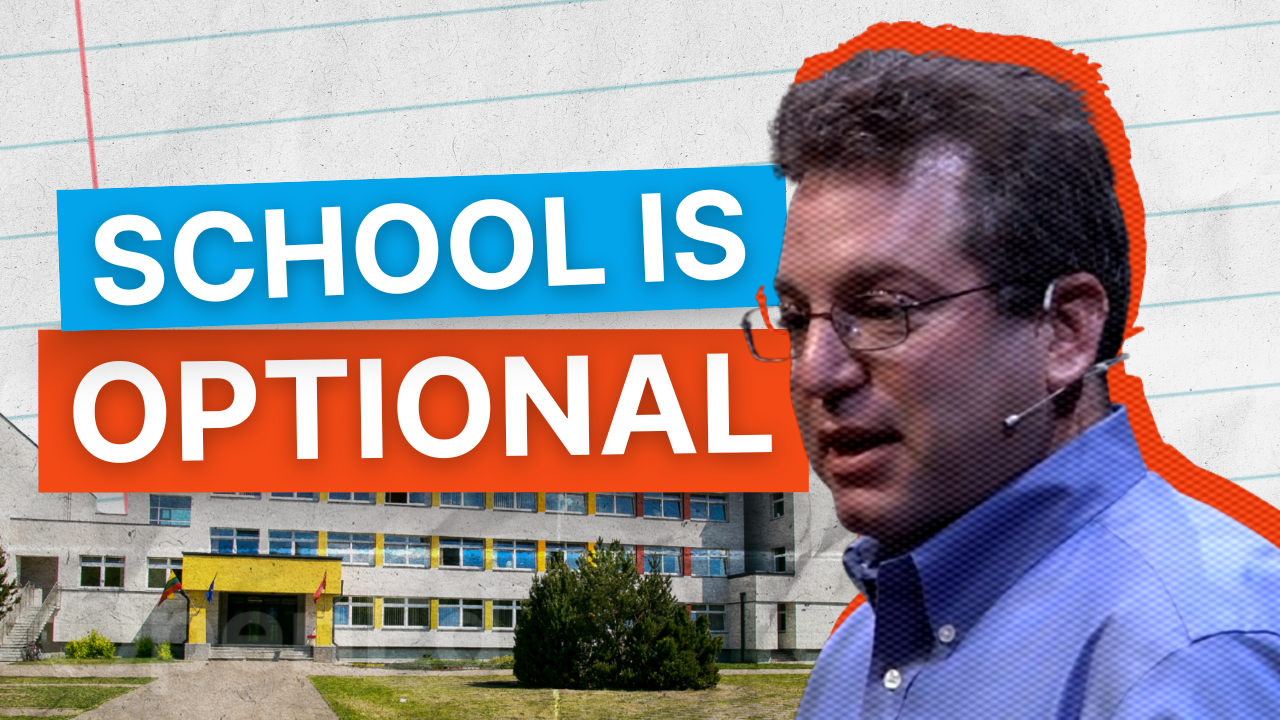## Timestamped Outline
**00:14** - The Night That Changed Everything: Reading the Teenage Liberation Handbook
**03:46** - Building North Star: If You Build It, They Will Come
**06:08** - The Mind-Blowing First Conversation: "I Don't Want to Be in Charge of You"
**09:02** - What Deschooling Actually Looks Like in Practice
**13:00** - Why Kids Are Born Ready for Autonomy
**19:50** - The 70% Who Wouldn't Homeschool Without North Star
**24:21** - Flipping the Question: Why Do We Think School Is Normal?
**28:45** - Has It Gotten Worse? The False Sense of Scarcity
**39:15** - Advice for Parents With No North Star Nearby
**45:31** - There's No Such Thing as Falling Behind
---
## 00:14 The Night That Changed Everything
**Ela:** Was there a specific moment when you decided something's different, I'm going to do this very differently?
**Ken:** It was the night I read the Teenage Liberation Handbook in fall 1995. I had been teaching for about six years at Amherst Junior High. My friend Joshua Hornick, an eighth grade science teacher, kept wanting me to read this book about homeschooling. I kept saying I didn't want to read a book about homeschooling.
Finally, on one lousy day when I was really mad about something at school, I started reading it and found out I didn't know anything about homeschooling. These kids were not going to school and getting away with it. Not only were they not going to school, they were just learning whatever they wanted to learn and going as far as they wanted and having a much better life than all these school kids were having.
Immediately it became obvious that what Joshua and I should do was quit our jobs and help all the school kids we were tormenting in school leave school and use this unschooling approach. To do so, we'd have to host a little center and make it more feasible for people to consider the idea. That was 1995. This is year 30 of North Star next week.
## 03:46 Building North Star: The Model
**Ela:** Explain the North Star method. What does it look like in person?
**Ken:** North Star is a physical building, an in-person community center. I routinely meet children ages mostly 11 to 18 who are miserable in school, and I say there's a different way to live and learn. You don't have to go to school at all. Don't find a different school, don't look for a charter school. Just stop going to school. I'll help you if you're under 16 write a homeschooling plan, and you'll be free and easy.
Most people don't want to do that alone. Most of the people I'm dealing with are not lifelong homeschoolers. These are people with three or four kids where the other kids are fine in school. They're busy, some are single parents, none perceive themselves to be homeschooling types.
We help you write a plan, and now you can come hang out with us at our center, which operates like any other adult community center. Like a gym or a health club or a religious congregation—open during certain hours. When you come in, there's a bunch of activities you could join, but if you don't want to, you could just sit in a chair and mind your own business. We assume you can figure that out for yourself.
Kids have a little headquarters and a weekly advisor at North Star to chat about things, classes to choose from, tutorials, and a social community of 50 to 60 other kids that come and go as they wish. Each one uses it as they wish. It turns out that people grow up quite healthy.
## 06:08 The Mind-Blowing First Conversation
**Ken:** Most kids walk out of the cornfields. They come out of school thinking their parents are dragging them to another school. In our first meeting, I say, I'm sorry you don't like school. Have you ever considered not going? And they do a double take. They're like, wait, what?
I tell them we're not a school. I don't want to be in charge of you. You can come here whenever you want. You can leave whenever you want. You can have your phone. You can have your food. Leave me alone. You can use us just as you please. That's really mind-boggling for most kids.
**Ela:** How do kids react to that?
**Ken:** Some say, thank God, or that's obvious, or of course. Others stop, do a funny look, and sit up straighter like, wait, maybe I want to hear what this guy has to say. There's a definite immediate shift in the conversation because kids often don't realize where they're coming. Telling kids I have this place but I don't want to be in charge of you is rather unique. No one has said this to them before.
They look at their parents like, really? It's a little bit Willy Wonka and the Chocolate Factory. This is real? It's been here while I was in school? People do this instead of the other thing? It's like The Matrix or something.
In cognitive psychology, they talk about assimilation and accommodation. Assimilation is when you fit things into buckets you already have in your brain. Accommodation is when you have to make a new bucket for something you didn't have a category for before. I can see their wheels turning. It's accommodation.
## 09:02 What Deschooling Actually Looks Like
**Ela:** Walk me through the experience of a kid starting at North Star. Are they disenfranchised for a bit, sitting around trying to test if this is real, then over time they start getting interested in topics?
**Ken:** All the things happen. It's like joining a new community. Some kids can walk in here the first day and go to three or four different classes. Most of our classes meet once a week—theater, book groups, science experiments, math, hiking, cooking. There's about 10 or 12 groups that meet every day.
Some kids will just jump right in and start going to things. In between, they'll sit in the common room and say to some other strange kid, do you want to play chess? Or some kid will say, do you want to walk to the corner store? And they go out and leave the building in the middle of the day, which is like the craziest thing they've ever done in their lives.
Other kids with anxiety and concerns will just come in and sit in a chair and watch the world go by. We also have a silent room, a library where no one will talk to you, so they can go hide in there if they want. They can stay for an hour or seven hours. People use a new program with the full range of ways any group of adults would use a new program.
## 13:00 Why Kids Are Born Ready for Autonomy
**Ela:** Why do you think kids are ready for that autonomy? A lot of people would probably argue they're not.
**Ken:** You are born ready for that autonomy. What kind of question is that? Why are kids ready to be allowed to choose how to spend their time? That's insulting. You think kids couldn't possibly know what they want to do with themselves?
**Ela:** I always like to steelman arguments. Having your perspective is really fascinating because you've seen it. It's not just a theory—you've lived this.
**Ken:** The most basic thing is normal humanity. After school in the summer, parents ask kids, do you want to go to this camp or not? Do you want to have piano lessons? Do you want to sign up for this sport or not? We live in a culture where asking people if they want to do stuff is kind of normal. We certainly do that with our partners, our spouses, our parents, our siblings. We don't boss them around.
Schooling is the abnormal thing. I'm just turning your question around 180 degrees. Why would you consider the kookiness of school to be normal and asking kids what they want to learn to be abnormal? That's insane.
## 19:50 The 70% Who Wouldn't Homeschool Without North Star
**Ken:** About 70% of the kids are coming out of school with us and they wouldn't be homeschooling or leaving school without us. In that group, some were going every day and getting straight A's and managing school just fine. A bunch were crashing and burning by refusing to go or having anxiety or self-harm or partial hospitalization programs. Some are autistic, lots of bullied kids, LGBTQ kids, non-conformists, outdoorsy types, artists and musicians—all the people who just go, this school thing, really, for how much longer do I have to do it?
It's not that they can't or won't, though some of them it is. The whole enterprise of school just seems like a misuse of their lives until age 18. Isn't there a better way to live? Couldn't they be allowed to do that, please? No one has really told them yes. And here, we will help you.
The 30% that's previously homeschooled—some have homeschooled and gone back to school because it wasn't so much fun. Some have homeschooled successfully but hit the end of that stage because most kids in their homeschooling group are going to school for high school. Some are doing just fine and are just coming here to check out North Star to see if it's going to add anything.
## 24:21 Flipping the Question: Who Actually Likes School?
**Ken:** How many people like going to school? Almost nobody likes going to school. Even the kids getting honor roll grades—would a third of the kids get honor roll? The rest are being told whatever for you. The kids with honor roll grades, some have too much stress.
Then you say, how many of you actually find this redeeming and interesting and you're glad you're learning all this good stuff at school with these good teachers? Maybe six kids. Then you ask those kids, would you rather they cancel vacation and just have school open year round? They all look at you like you're from Mars. No, they can't wait for their own time to be in charge of themselves, to learn what they want their way. They all can't wait to be done with school too.
Who likes going to school? It's really kind of sad. That's why I quit. The same kids who hate going to school often love their summer camps, their sports and theater and other activities. They cry when those things are over. I want to be that person running those programs where they're sad when they're done with me. That is how kids feel about North Star, by the way. They object to snow days. Why are we closed? We could have gotten there. Why are we closed for the summer?
I've won. I've achieved that goal to be on that side of things. But the way to do that is to get out of the whole heaviness of the schooling model.
## 28:45 Has It Gotten Worse?
**Ela:** Have you seen this get worse over time or is it the same?
**Ken:** It's certainly not getting better. I don't know if it's getting worse. I think elementary school probably has gotten worse in the last 20, 25 years with the emphasis on testing and less recess and pestering kids to learn more. Elementary school has probably become less fun than 20, 30 years ago.
I don't know if high school is any worse now than before. There is more state testing and all this accountability nonsense. The sense of scarcity—which I think is a false sense—is maybe worse than ever. There's very few good jobs in America, and if you don't go to school and get good grades, you'll never go to a good college, you'll never get one of those few good jobs. The only way to have a decent adulthood in America is to go to school and do well as a third grader. If by fourth grade you're not doing well, you're probably doomed as an adult.
I think that's worse. I think it's false. Given the cost of four-year private colleges and liberal arts colleges, it's criminal. I went to Amherst College, so I benefited from the whole system in some way. The cost of a four-year Amherst College diploma now is outrageous. To assert that that kind of experience should be the goal for everybody just creates a false sense of stress.
We should be helping people learn skills and have experiences. There's so many things you could do from 12 to 18 besides try to prepare to get accepted to Amherst College. Plus these unschoolers get into Amherst College anyway. Just go live your best life and it turns out you'll be appealing. Go learn a few languages, travel the world, work with sheep, learn plumbing and electrical, be a solar panel expert. Go do stuff.
We see so many kids use community college well ages 15 to 20 without going to four-year schools. There's so many trades and certificates and internships and things to do and ways to explore the world. There's just more pressure than is appropriate on kids today.
## 39:15 Advice for Parents With No North Star Nearby
**Ela:** Where there's not a North Star, what would you recommend families do? They have a kid that's really frustrated, not flourishing, and they don't know what to do next.
**Ken:** I'll give you a few options.
**Option one:** Stay in school just for the social cultural value, the friendships. Let your kids get bad grades and don't fret about it. Assume they're never going to graduate from that high school. Sometime eventually they'll drop out and get a GED and pass it and go to community college if they want. You're not really depending on the credits or transcript from this place. Use it for what it's offering—a community center function for your child. Let your kid miss all the days they need to. Let the school threaten you till the cows come home and just don't stress about it. As long as your kid enjoys going and has some friends and it serves a purpose in your family, use it as long as you can milk it. When you're done, get out and let it go. It's not a stain. Don't internalize any negative messages.
**Option two:** Homeschool. You get out. You create your best routine as you can. There's a whole national network of a zillion online things people could be part of. Outschool and the whole—some expensive, some inexpensive, some free. You pick and choose a couple things and try to live your best life outside of school. That might be a lot of after-school arts, clubs, sports from three to seven every day. They have scouts, church groups, every other youth thing under the sun.
During the day they're kind of on their own. There's not a lot of homeschoolers for you. Do an Outschool class and do the best you can. Go volunteer at the library, go volunteer at the senior center. You're not going to have a peer-oriented life. Let it go. Have an interesting life. Go work with the animals at the vet once a week, work at the senior center once a week, volunteer at the library once a week. Build the best life you can. Stop worrying about school. As your kid gets older, you see what sticks. They can volunteer and get jobs in those areas. Maybe it's a museum, maybe it's who knows what, but they start finding themselves.
It's hard. I don't mean to make that sound easy. It's anxiety-inducing. If you're the only one pulling your kid from school and you're not really trying to get them to do a homeschool curriculum for credit and graduation purposes, you're just kind of bypassing the whole schooling rubric to let your kids do interesting things all the time. People will think you're atrociously terrible. Particularly your family members, grandparents, aunts and uncles will think you're doing a terrible thing to this child because you're not making them do the conventional stuff.
They're wrong. They don't know they're wrong. It's really hard for people to grasp what we're talking about. But hold the line and say, this kid's going to be so on track at 18, so much more mature and healthy and wise and self-aware than their peers. More importantly, tell me your second-best alternative to what we're doing. We're trying the best we can.
## 45:31 Rapid Fire Questions
**Ela:** Why is there no such thing as falling behind?
**Ken:** You can always learn stuff tomorrow or today. You could run right home and learn stuff. Leave me alone. I didn't do it when everybody else did it, so now I lose? Shut up.
**Ela:** What's your advice to parents about being judged?
**Ken:** That's hard because I don't know these people and the uniqueness of their situations. The right answer is to trust yourself and value your own self-judgment above other people's. It's hard for people to do. When you can't, consider what's the next best option. I think I'm doing the best thing for my kid. As long as you feel like you're always looking at what else you might be doing and you're pretty sure you're still on the right track, stick with what you got.
**Ela:** What's some encouragement to parents who know that something is wrong?
**Ken:** You're right. Something's wrong. Your kid doesn't want to do the things they're being asked to do in the way they're being asked to do them. The problem is most likely not your child. Most likely your child is healthy, rational, and responding appropriately for them. If you can listen to your child and brainstorm alternatives with them, including not going to a place that asks you to do things that you think are senseless, see what you can do.
A lot of these problems can't be fixed in the schooling model. Switching to a different school isn't really much of a solution in most cases. Your kid is probably healthy and right. Good for them for being a squeaky wheel. That's what we want—for your kid to stand up for themselves. Let's see that as your kid standing up for themselves as a healthy first step.
-

.webp)



%20(1).png)
.png)
.png)